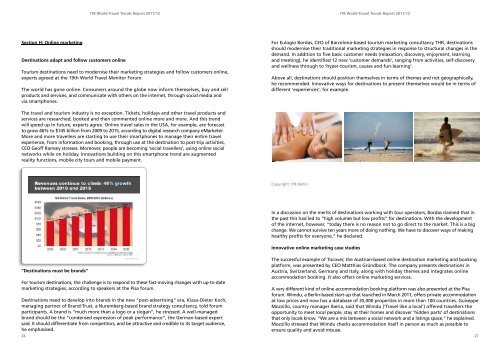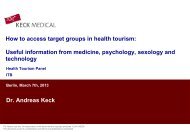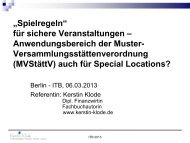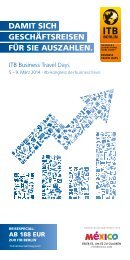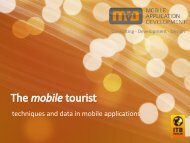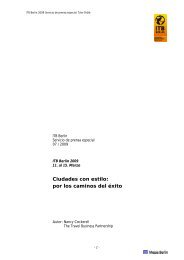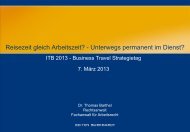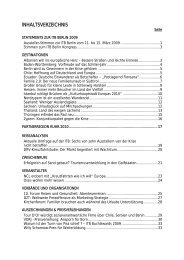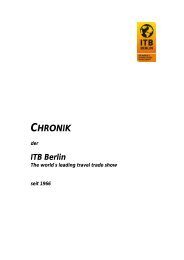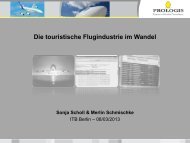itb world travel trends report 2011/2012 - ITB Berlin Kongress
itb world travel trends report 2011/2012 - ITB Berlin Kongress
itb world travel trends report 2011/2012 - ITB Berlin Kongress
You also want an ePaper? Increase the reach of your titles
YUMPU automatically turns print PDFs into web optimized ePapers that Google loves.
Section H: Online marketing<br />
Destinations adapt and follow customers online<br />
<strong>ITB</strong> World Travel Trends Report <strong>2011</strong>/12 <strong>ITB</strong> World Travel Trends Report <strong>2011</strong>/12<br />
Tourism destinations need to modernise their marketing strategies and follow customers online,<br />
experts agreed at the 19th World Travel Monitor Forum.<br />
The <strong>world</strong> has gone online. Consumers around the globe now inform themselves, buy and sell<br />
products and services, and communicate with others on the internet, through social media and<br />
via smartphones.<br />
The <strong>travel</strong> and tourism industry is no exception. Tickets, holidays and other <strong>travel</strong> products and<br />
services are researched, booked and then commented online more and more. And this trend<br />
will speed up in future, experts agree. Online <strong>travel</strong> sales in the USA, for example, are forecast<br />
to grow 46% to $145 billion from 2009 to 2015, according to digital research company eMarketer.<br />
More and more <strong>travel</strong>lers are starting to use their smartphones to manage their entire <strong>travel</strong><br />
experience, from information and booking, through use at the destination to post-trip activities,<br />
CEO Geoff Ramsey stresses. Moreover, people are becoming ‘social <strong>travel</strong>lers’, using online social<br />
networks while on holiday. Innovations building on this smartphone trend are augmented<br />
reality functions, mobile city tours and mobile payment.<br />
“Destinations must be brands”<br />
For tourism destinations, the challenge is to respond to these fast-moving changes with up-to-date<br />
marketing strategies, according to speakers at the Pisa forum.<br />
Destinations need to develop into brands in the new “post-advertising” era, Klaus-Dieter Koch,<br />
managing partner of Brand:Trust, a Nuremberg-based brand strategy consultancy, told forum<br />
participants. A brand is “much more than a logo or a slogan”, he stressed. A well-managed<br />
brand should be the “condensed expression of peak performance”, the German-based expert<br />
said. It should differentiate from competitors, and be attractive and credible to its target audience,<br />
he emphasised.<br />
For Eulogio Bordas, CEO of Barcelona-based tourism marketing consultancy THR, destinations<br />
should modernise their traditional marketing strategies in response to structural changes in the<br />
demand. In addition to fi ve basic customer needs (relaxation, discovery, enjoyment, learning<br />
and meeting), he identifi ed 12 new ‘customer demands’, ranging from activities, self-discovery<br />
and wellness through to ‘hyper-tourism, causes and fun-learning’.<br />
Above all, destinations should position themselves in terms of themes and not geographically,<br />
he recommended. Innovative ways for destinations to present themselves would be in terms of<br />
different ‘experiences’, for example.<br />
Copyright: <strong>ITB</strong> <strong>Berlin</strong><br />
In a discussion on the merits of destinations working with tour operators, Bordas claimed that in<br />
the past this had led to “high volumes but low profi ts” for destinations. With the development<br />
of the internet, however, “today there is no reason not to go direct to the market. This is a big<br />
change. We cannot survive ten years more of doing nothing. We have to discover ways of making<br />
healthy profi ts for everyone,” he declared.<br />
Innovative online marketing case studies<br />
The successful example of Tiscover, the Austrian-based online destination marketing and booking<br />
platform, was presented by CEO Matthias Gründbock. The company presents destinations in<br />
Austria, Switzerland, Germany and Italy, along with holiday themes and integrates online<br />
accommodation booking. It also offers online marketing services.<br />
A very different kind of online accommodation booking platform was also presented at the Pisa<br />
forum. Wimdu, a <strong>Berlin</strong>-based start-up that launched in March <strong>2011</strong>, offers private accommodation<br />
at low prices and now has a database of 35,000 properties in more than 100 countries. Guiseppe<br />
Mozzillo, country manager Iberia, said that Wimdu (‘Travel like a local’) offered <strong>travel</strong>lers the<br />
opportunity to meet local people, stay at their homes and discover ‘hidden parts’ of destinations<br />
that only locals know. “We are a mix between a social network and a listings space,” he explained.<br />
Mozzillo stressed that Wimdu checks accommodation itself in person as much as possible to<br />
ensure quality and avoid misuse.<br />
26 27


